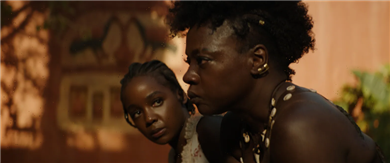
[Editor’s note: The following article contains spoilers for ” The Woman King.”]
As Gina Prince-Bythewood’s historical epic “The Woman King” was hitting theaters on Friday after a successful premiere at the Toronto International Film Festival last week and a solid Thursday night opening of nearly $2 million in early showings, on Twitter, a different narrative was unfolding.
As the hashtag #BoycottWomanKing trended on the social media platform, a number of users professed their disinterest in seeing a film that they believed obscured the history of the Kingdom of Dahomey, in which the Viola Davis-starring film is set. At issue: that the film, set in 1823, does not accurately portray the relationship between the West African country and the slave trade.
The fervor over the film’s perceived inaccuracies appeared to be stoked by the film’s marketing, which center it as predominantly focusing on the all-female warrior army the Agojie, plus recent articles that purport to share the “real history” of the kingdom (including this National Review piece, which dives into the history of how some African nations, including Dahomey, were guilty of participating in the slave trade with European invaders, offering up their own countrymen in exchange for material goods).
But while those historical notations are true, they also don’t reflect the content of Prince-Bythewood’s film itself, which does not shy away from the link between the Kingdom of Dahomey and the repugnant slave trade.
In fact, much of the film, written by Dana Stevens and Maria Bello, follows that exact storyline, with Davis’ revered general Nanisca attempting to sway her king (John Boyega) to abandon the slave trade because of its horrific impact on their fellow countrymen. It’s not just mentioned in the film, it’s a large portion of the drama of its story. But when people boycott a film, presumably without seeing it first, that message is lost.
“I learned early on you cannot win an argument on Twitter,” Prince-Bythewood told IndieWire during a recent interview. “And I know all of that is going to go away once they see the film. There’s an assumption we’re not dealing with it and we are dealing with it. So I have to live in that confidence. They’re going to see the film and they’re going to see it.”
As mentioned in IndieWire’s review of the film, “Nanisca is a fierce warrior and an impressive leader, but she’s grown tired of violence, or at least of the things that make it feel necessary, like slavery. (Davis is, of course, perfect casting for a role that requires both gravitas and deep empathy.) More than anything, she wants King Ghezo to see the possibility of a Dahomey that does not need to engage in the slave trade — yes, they sell to the white men; no, ‘The Woman King’ does not turn away from this part of history — to be prosperous. That it does not need to sell any Black body to get ahead.”
“I really wish that the conversations could happen around the film as opposed to around the anticipation of the film, because I think that we did not hesitate to investigate those areas,” producer Cathy Schulman told IndieWire during a recent interview. “The fact is that slavery is driven by material gain. It offered up people on this continent an option to make money that should not have been offered up or forced upon them. And, once it was, it created all sorts of internal conflict, and we don’t hesitate in visiting that within the film.”
She added, “I’m a big believer that information is power, and I think that understanding issues surrounding slavery from the standpoint of the African perspective is relevant. We look at it most of the time from what happened once these people were enslaved and were actually landing here in America versus what was going on on the other side.”
Deadline reports that the film is estimated to earn $18 million this weekend, boosted in part by positive word of mouth: the film received an A+ CinemaScore in early showings, signaling that those who had actually seen the film enjoyed what they saw enough to heartily recommend it to others.
A Sony release, “The Woman King” is now in theaters.
Source: Read Full Article